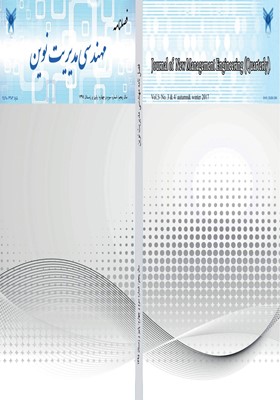بررسی رابطه تعادل بین کار و زندگی و عملکرد سازمانی
محورهای موضوعی : مدیریت
حاجیه رجبی فرجاد
1
*
![]() ,
لیلا موسوی فرد
2
,
لیلا موسوی فرد
2
1 - استادیار گروه مدیریت منابع انسانی دانشگاه علوم انتظامی امین
2 - کارشناس ارشد مدیریت دولتی
کلید واژه: کارکنان, عملکرد سازمانی, شعب بانک, تعادل بین کار و زندگی,
چکیده مقاله :
سازمانی که به زندگی کارکنان و متعادل سازی وظایف سازمانی با آن توجه دارد، در مسیر افزایش عملکرد سازمانی گامهای مثبتی را برداشته است. این پژوهش به با هدف تعیین رابطه تعادل بین کار و زندگی و عملکرد سازمانی می باشد، روش تحقیق توصیفی-پیمایشی بودهاست. جامعه آماری کارمندان شعب بانک رفاه سطح شهر تهران به تعداد400 نفر می باشد که از طریق فرمول کوکران 196 نفر به عنوان نمونه به روش تصادفی ساده انتخاب شده اند. ابزار گردآوری اطلاعات دو پرسشنامه استاندارد تعادل بین کار و زندگی و عملکرد سازمانی می باشد. روایی پرسشنامه از طریق محتوایی و پایایی پرسشنامه ها از طریق آلفای کرونباخ برای پرسشنامه تعادل کار و زندگی84/0 و عملکرد سازمانی81/0 می باشد. روش تجزیه و تحلیل داده ها آزمون کلوموگروف اسمینروف، همبستگی پیرسون و آزمون فریدمن استفاده شده است. نتایج به دست آمده حاکی از آن است که در این پژوهش ضریب همبستگی تعادل بین کار و زندگی و عملکرد سازمانی 529/0 که در سطح 05/0 معنادار میباشد. همچنین همه مؤلفههای تعادل بین کار و زندگی با عملکرد سازمانی رابطه مثبت و معناداری داشتهاند. اما در این میان متغیر میزان علاقه نسبت به سایر مؤلفه ها از همبستگی بیشتری نسبت به سایر مؤلفه ها برخوردار بود.همچنین در اولویتبندی رتبهی این ابعاد نشان میدهد که حمایت سازمان بیشتر از بقیه متغیرها مورد توجه قرار گرفته است و متغیر وضعیت نظارت پایینترین میزان توجه را در سازمان به خود اختصاص داده است.
Ahmadian, Majid; Ghorbani, Rahim. (1392). Investigating the Relationship between Intellectual Capital and Organizational Performance: Case Study of the Ministry of Economic Affairs and Finance, Economic Magazine, Nos. 11 and 12: 111-130.
Allameh, Seyed Mohsen and colleagues. (2015). Investigation of the relationship between quality of work life of employees with emotional-mental involvement. Quarterly Journal of Human Resource Management Researches at Imam Hossein University (AS), seventh year. No. 22.: 69-49.
Asadi, Ario. Fayyazi, Marjan and Yasori, Tahmored. (2014). Organizational factors affecting the balance of work and life of the employees of a vehicle manufacturing company. Faculty of Management, University of Tehran. governmental management. Volume 6. Issue 2,: 1-18.
Hongmei, S. & et,al. (2015). Practitioners’ work-life conflict: A PRSA survey, Public Relations Review 41, 415–421.
Kalysh, K. & et,al. (2016). Help or hindrance? Work–life practices and women in management, School of Management, University of South Australia,, ScienceDirect, The Leadership Quarterly xxx.
Kazmi, S.A.Z. and Naaranoja, M. (2015). Cultivating strategic thinking in organizational leaders by designing supportive work environment. Procedia - Social and Behavioral Sciences, Vol 181, pp 43 – 52.
khaki, Gholam Reza (2009). Research method with approach to thesis writing. Tehran: Rebecca Publishing.
Lan, X. M. & Chong, W. Y. (2015). The Mediating Role of Psychological Empowerment between Transformational Leadership and Employee Work Attitudes. Social and Behavioral Sciences, 172:184 – 191.
Lotfi, Ali. (2016). Knowledge management and its role in organizational performance of Tehran Trade Bank, Islamic Azad University, Electronic Unit, Pages 1-88.
Muhamad Khalil, O. (2013). Non Standard Work Arrangements and Affective Commitment: the Mediating Role of Work-Life Balance, ScienceDirect, Procedia - Social and Behavioral Sciences 107, 4 – 12.
Najarzadeh, Fatemeh. (2015). Study of the relationship between work-life balance and social responsibility of managers of government departments of Kerman, MSc dissertation, Payame Noor University of Tehran, Faculty of Accounting and Management, 1-25.
Naude, M. (2014). Strategic thinking to enhance sustainable development: A proposed framework. The Clute Institute International Academic Conference, Munich, Germany
Pak negar, Beata. (2016). Effect of Balance between Work and Life on Organizational Performance of Employees from the Point of View of Bank Staff (Case Study: Branches of Bank of Commerce in the Northwest of Tehran), Islamic Azad University, Naraq Branch: 1-36.
Panisoaraa, G. & Serbana, M. (2013). Marital Status and Work-Life Balance, Procedia - Social and Behavioral Sciences 78 (2013) 21 – 25.
Parker, Richard. (2013). Ergonomics, Safety and Health in Forestry and Related Industries, COHFE Parl report, p 16.
Rahnavard, Farajolooh.(2008), Effective Factors on Improving the Performance of Public Sector Organizations, Journal of Humanities and Social Management, Eighth, No. 4 (Successive 31), Winter 87.
Robbins, Stefan.(1989). Organizational Behavior (Fred) Volume One. Translated by Ali Parsaean and Seyed Mohammad Arabi (1997). second edition. Tehran Weekly Publications of Cultural Research.
Roshan bin, Sahar and Pahlavan, Mohammad. (2015). The Relationship Between Quality of Life and Occupational Exercise among Exceptional School Staff. Exceptional education. Fifteenth century No. 130.: 30-23.
Rostami, Reza et al. (2015). The effect of quality of working life on job performance by mediating the psychological empowerment of citizens. Urban Management Quarterly. No. 41: 322-310.
Sabet Pour, Mohammad (2013). Investigating the Position of Organizational Performance in the Balance between Work and Life in the Shipyard Group. Master thesis, Payame Noor University of Tehran, Faculty of Accounting and Management,: 1-19.
Shams Morkalani, Gholamreza; Mashayekhi, Mansoureh; Soleimani, Saeed (2014). Explaining the Role of Organizational Intelligence in Promoting Organizational Performance: A Case Study of High School Directors in Tehran, Volume 10, Number 31, Spring: 165-189
Wu, L. & et,al. (2013). Relationships between work–life balance and job-related factors among child welfare workers, Children and Youth Services Review 35, 1447–1454.
Yazdan Shenas, Mehdi. & Hashempour, Mehdi. (2015). The Effect of Work-Life Equilibrium Components on Organizational Performance; Case Study: Qom Province Medical Sciences University. Fourth International Conference on Accounting and Management, University of Tehran: 1-17.
Zakerian, Seyyed Abolfazl et al. (2013). Study of the dimensions of quality of work life and its relationship with job satisfaction in an automotive industry. Ergonomics magazine. Quarterly Journal of Iranian Ergonomics and Human Factors Engineering. Volume 1. Number 3. P. 46-36.

